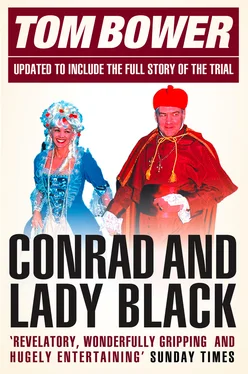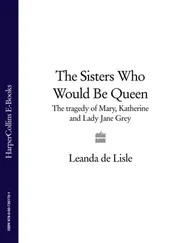Fate determined a strange climax for both of them at the end of the reception. Sharing a limousine, Conrad Black and Allan Fotheringham argued violently, and parted on bad terms. Across town, lying in bed after her wedding celebrations, Barbara Amiel was presented by her new husband with a pre-nuptial agreement that had been drawn up earlier. ‘Sign here,’ said Graham. Amiel did as she was ordered. She was in love.
*Unless the context indicates otherwise, throughout the book monetary values are given in American rather than Canadian dollars.
FLOPPED IN HIS ARMCHAIR, regularly refilling his glass with neat vodka, George Black sermonised to his thirty-one-year-old younger son Conrad throughout the night of 29 June 1976. Despite the appearance of civility presented by the chintz and the solid furniture in the grand house in the Bridle Path, Toronto’s most prestigious neighbourhood, the resentful sixty-seven-year-old regularly vented his bitterness on the subject of wealth and power. Frustrated by isolation and depression, the ailing recluse had astutely accumulated substantial capital from his business activities, but his withdrawn personality and habits had deprived him of any influence, with one exception: his son Conrad.
Over the years, his father’s lectures on history, power and finance had inculcated in Conrad similar feelings about supremacy and manipulation. Systematically, George had dragooned the youthful Conrad to utilise his photographic memory by giving boastful theatrical performances at social occasions. With little prompting, the precocious boy had paraded his expertise on Napoleon, Franklin D. Roosevelt, Abraham Lincoln, Charles de Gaulle and other political giants. Similarly, if the opportunity arose, audiences were amazed by his encyclopaedic recitations of battleships, armies and warfare stretching back to the eighteenth century. Without hesitation, as a party piece the teenager could recite the names of all the ships, armies and generals engaged in the most obscure European battles, or of successive prime ministers and monarchs over two centuries, or, if allowed, repeat keynote speeches of statesmen long dead. ‘Reel off the fifteen leading ships in the Spanish Armada,’ George Black would order, ‘and the names of all the admirals in the First World War.’ His son’s memory was infallible. Late into the night, amid a mist of tobacco smoke, those tutorials and memory games about world history infected the loner’s mind with the importance of defying the vulnerability of human weakness.
Stifled by depression, George Black failed to appreciate the burden he was inflicting upon his son. The father offered his children no physical affection, and his wife Jean, always known as ‘Betty’, was similarly cold and remote. In that loveless atmosphere, Conrad compensated for his emotional insecurity by revelling in the lives of historic heroes. At eight, he had been smitten by the memoirs of General de Gaulle, the underdog who rebelled against unpopularity and overcame adversity to become a national hero. Defiance was a trait Conrad Black was encouraged to admire by his father, an outsider cruelly spurned by lesser men.
Ever since George Black had been unceremoniously dismissed in 1958 from the Argus Corporation, a sprawling Canadian conglomerate, his resentment had festered. During their all-night sessions, Conrad Black was imbued with a mission to exact revenge upon those responsible for humiliating his father. He knew them well, because, despite his reclusiveness, George Black had introduced his son to a remarkably privileged lifestyle.
Few could have imagined the transformation of George Black over the previous thirty-six years. In 1940 the tall, articulate, aggressive twenty-nine-year-old accountant was managing a factory in Montreal producing propellers for Allied war planes. With pride, he recounted how his company was the only Canadian government-owned manufacturer during the war to earn a profit. But there was also frustration. The graduate from Winnipeg, a provincial outpost, damned his work as unglamorous and his colleagues as ‘a hopeless bunch’. 1 In July 1944 his future appeared lacklustre, until the banker Edward P. Taylor, also from the Canadian provinces, offered an escape. Unlike George Black, Taylor had identified a recipe for great personal wealth.
Ten years older than Black, Taylor enjoyed the expensive lifestyle of a clever but unpopular speculator who paraded as a prominent racehorse owner at the Jockey Club of Canada. In 1944 he was convinced that the end of the war would unleash huge prosperity. To exploit that opportunity, he established Argus with a group of like-minded Toronto investors, including Eric Phillips and John ‘Bud’ McDougald. Based at 10 Toronto Street, an elegant, two-storey, neo-classical building not far from Bay Street, the city’s financial area, the partners pooled their assets invested in Canadian companies. Among those investments was Canadian Breweries, which George Black was invited to manage on the company’s behalf.
During those all-night sessions, which started in Conrad’s childhood, George Black regaled his son with stories of his struggle to transform Canadian Breweries into an international success. Promoted as the company’s president in 1950, he had savagely cut costs, dismissed staff and created success from disaster. The prize was phenomenal growth – sales and profits had tripled – delivering Taylor’s ambition to control the world’s biggest brewery, embracing Canada, the USA and Britain. The downside was the effect on Black’s health. Insomniac and increasingly intoxicated, he would arrive in his office at midday, boasting that because he delegated authority his presence was not required. Management of the empire, he insisted, could be achieved by telephone, without the need for him to visit the factories. The essence of business, George emphasised to his son, was strategy rather than micro-management. In reality, ‘delegation’ had become George Black’s excuse to recover from hangovers and the morning’s vodka.
High among Black’s priorities was the need to confront the trade unions, which he despised. In 1958, by forging an alliance with other brewers, he challenged the unions to remove their restrictive practices, provoking an acrimonious strike. As his profits evaporated, Taylor lost confidence in Black. He wanted to avoid strikes and reverse the decentralisation. ‘You’re out of your skull,’ Black told Taylor. In October 1958 George Black was fired. He damned Taylor, cleared his desk and went home. At forty-seven, he was unemployed, and had received no thanks for his achievements. From the sidelines he watched as Canadian Breweries declined. No longer the world’s biggest brewer, the company was sold in 1968 to a competitor.
Bitter but realistic, George Black noted how greed, arrogance and dishonesty had become the hallmark of Argus’s directors. While some in Bay Street embodied the best of Presbyterian honesty, Taylor and Bud McDougald, the company’s president, were financial cowboys enjoying a reckless lifestyle, avoiding taxes and cheating the minority shareholders. At the hub of that intrigue, McDougald used intimidation and flattery to disguise rampant dishonesty, known in Toronto Street as ‘pushing the envelope’. As George Black understood so well, McDougald was using Argus, a company floated on the Toronto stock exchange, as his private piggybank, spending shareholders’ money to fund a tycoon’s way of life.
Well-dressed and shamelessly ostentatious, McDougald played the mogul to perfection – serving dinner on gold-plated china, hanging chandeliers in his garage, travelling in custom-built cars and private planes, and walking with an undisguised swagger to impress his audience. Teetotal, uneducated but shrewd, the former bond salesman posed as Canada’s pre-eminent social and commercial aristocrat, suavely speaking way above his financial weight, and accustomed to fawning treatment. Unlike other Canadians, McDougald drove around London like royalty in a Rolls-Royce Silver Wraith, mixing with nobles like the Duke of Wellington, the Marquess of Abergavenny and Lord Crathorne, and standing near the Queen when she inspected her racehorses being trained in his stables at Kingsclere in Hampshire. 2 In Palm Beach, McDougald was the President of the Everglades Club, the social centre for the local super-rich, where Jews were not admitted as members, or even for lunch. In future years this did not diminish Conrad Black’s apparent awe for McDougald’s technique of buying people off with presents and perks.
Читать дальше












